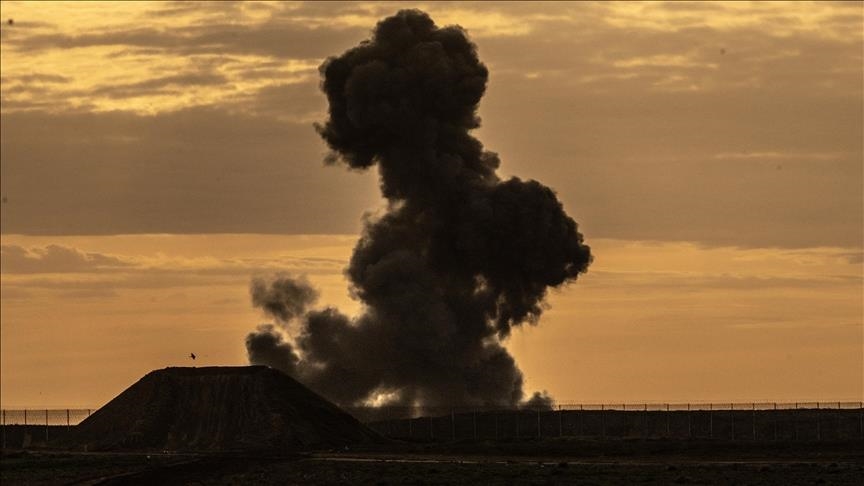US port plans in Gaza have 'hidden objectives': Expert
'A floating port off the shores of Gaza is a humanitarian facade hiding voluntary migration to Europe,' and 'undermines enclave's sovereignty,' Jordanian expert tells Anadolu

AMMAN, Jordan
Since the outbreak of the war on Gaza on Oct. 7, 2023, US President Joe Biden and his administration have continued to demonstrate unwavering support for Israel, leading some critics to view Washington as a key player in the conflict.
However, a recent statement by Biden on Friday introduced a surprising development as he announced plans to direct the US military on an "emergency mission to establish a port in the Gaza Strip" to get humanitarian aid to the Palestinian enclave.
But observers see another aspect to the floating port, linked to encouraging voluntary Palestinian migration to Europe and eliminating the role of the Rafah border crossing with Egypt, essentially placing Israel in control of all Gaza crossings and ending any Palestinian sovereignty over them.
'Hidden objectives'
Hisham Khreisat, a Jordanian military and strategic affairs expert, told Anadolu that "the floating port off the shores of Gaza is a humanitarian facade hiding voluntary migration to Europe."
"This military tactical port will receive Israeli approval because Prime Minister Benjamin Netanyahu has been seeking this idea since the beginning of the war, aiming for the voluntary displacement of Gazans and their flee to Europe," he added.
He considered the idea of establishing the port "not new," pointing out that it is "an old subject raised 10 years ago."
"But Avigdor Lieberman (leader of the far-right 'Israel Our Home' party) failed the idea when he was the defense minister at the time, and Minister of Transportation Israel Katz then," he added.
The expert continued: "Katz re-proposed the idea again, reaching an agreement from Cyprus and Greece."
He explained that "a port in Cyprus, paid for by the US, will be allocated so that it reaches the site of the American port in Gaza's Khan Younis beach."
Khreisat emphasized that "the crucial thing is that all ships sending humanitarian aid will not go directly to the American port in Gaza but will go to the Ashdod port to be checked, then sent under Israeli navy control and drones to the Palestinian territory."
"The US military will remain at sea and will supervise the port because Gaza is considered a hostile environment," he said.
"The ships from the Cyprus port to Ashdod will be under the control of the Israeli Navy and satellites," Khreisat elaborated.
Immediate and future concerns
The Jordanian expert said he believes that "Biden is very concerned about the consequences of the Israeli army's invasion of Rafah and the failure to end the humanitarian disaster in Gaza, which will reflect on the election results in the US."
"Therefore, he (Biden) will rush to build the port," he continued, noting that "there will be no deployment of US forces in Gaza, but there will be international agencies tasked with overseeing the delivery of aid."
He added: "The aid will be shipped from Larnaca Airport in (Southern) Cyprus, which is the main relief center."
Khreisat confirmed that "Israel will agree to the port for two reasons: facilitating the prisoner exchange deal and the ground attack on Rafah without provoking Washington."
He concluded that "the Rafah crossing will undoubtedly be out of service because Israel does not trust it and considers it the main entry point for Hamas weapons."
Israeli Prime Minister Netanyahu claims that a Rafah City assault is key to victory and that Palestinian resistance groups acquire arms through smuggling through Egypt.
Rafah crossing is crucial for humanitarian aid access, as Israel's restrictions threaten famine in northern regions of the enclave.
Israel's planned aggression on Rafah, a last refuge for the 1.4 million displaced people, has raised regional and international concerns.
Israel has waged a retaliatory offensive on Gaza since a cross-border attack by Hamas on Oct. 7. The offensive has killed nearly 31,000 Palestinians and injured over 72,500 others amid mass destruction and shortages of necessities.
Tel Aviv has also imposed a crippling blockade on the Palestinian enclave, leaving its population, particularly residents of northern Gaza, on the verge of starvation.
About 85% of Gazans have been displaced by the Israeli onslaught amid acute shortages of food, clean water, and medicine, while 60% of the enclave's infrastructure has been damaged or destroyed, according to the UN.
Israel is accused of genocide at the International Court of Justice, which in an interim ruling in January ordered Tel Aviv to stop genocidal acts and take measures to guarantee that humanitarian assistance is provided to civilians in Gaza.
* Writing by Mohammad Sio in Istanbul
Anadolu Agency website contains only a portion of the news stories offered to subscribers in the AA News Broadcasting System (HAS), and in summarized form. Please contact us for subscription options.







